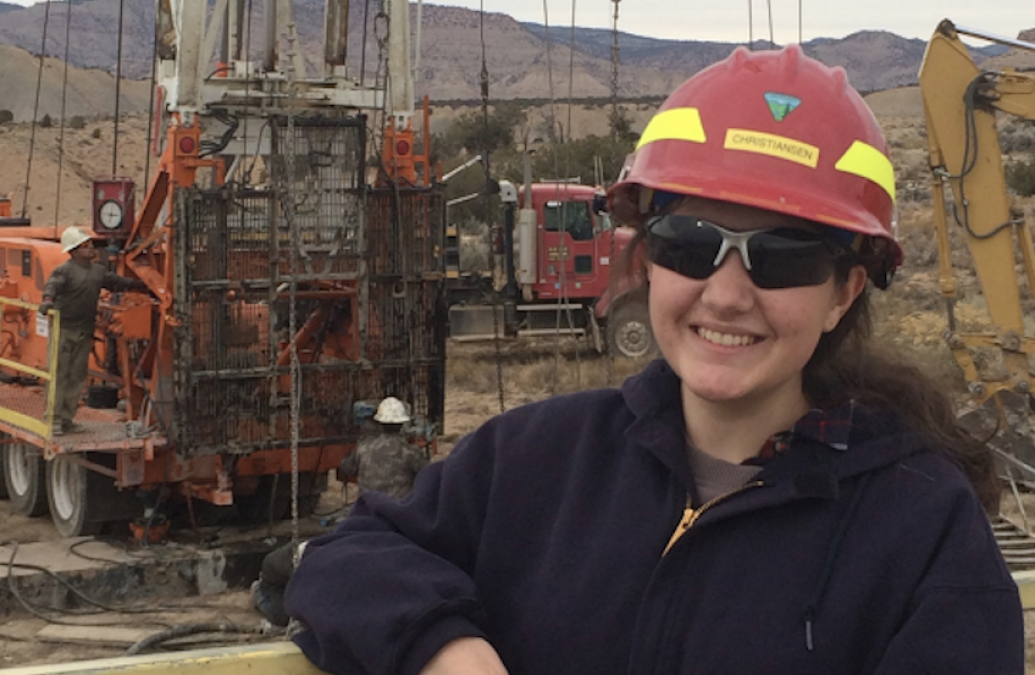Brown in Washington Program Sheds Light on the Significance of Bureaucracy for Blake DeVaney '19

In an effort to share student experiences in Washington with students on campus, Fall 2017 Brown in Washington fellows were asked to take a photo and write a caption that helps describe a memorable part of their learning experience while working with the D.C. community during their semester away.
Blake DeVaney ‘19, a Geology-Mathematics and Physics concentrator, reflected on her semester interning at the US Department of the Interior, Bureau of Land Management.
"It was my third day in Colorado, I was sitting in the passenger seat of a dirty government pick-up truck, and I was trying to absorb every detail about this new place. The landscape was different than anything I had ever seen, with wide expanses of flat, dry, grassy land flanked on either side by mountains and buttes and the Colorado River flowing to my left. On this particularly overcast afternoon, I was headed to visit an orphaned oil well about forty-five minutes away from the city of Grand Junction. This well was drilled on Bureau of Land Management land in the 1980s, and when the operating company went bankrupt, it was abandoned along with roughly five other wells.
This left the Bureau of Land Management responsible for plugging the wells and reclaiming the adjacent lands. I had been interning with the Washington office of the Bureau of Land Management for about two months and was attending a conference on oil and gas drainage when it was suggested that I might have the opportunity to go with the petroleum engineer from the Grand Junction field office as he went to check in on the plugging process for some nearby orphaned wells. I quickly requested to be able to ride along just so I could see what the field work was like.
For the two days prior, I had been sitting in on all the workshop sessions and though I didn’t quite understand the presentations about drainage, I learned a lot about the interactions between the three organization levels in the Bureau: the field offices, state offices and the Washington office. The Washington office, where I was interning, serves as a go-between for the state and field offices and the leadership of the BLM. They provide assistance to and communicate the needs and concerns of the state and field offices while handing down directives and policy decisions from the leadership within the BLM and the greater Department of the Interior. The state and field offices conduct the day to day management of the federal lands within the constraints set forth by the policies received from the Washington office. However, due to the continuously changing nature of policies and standards from administration to administration and the sometimes vague nature of policy directives that are intended to be supplemented with less formal verbal guidance, the state and field offices frequently maintain practices that are inconsistent with federal policy. The vast differences between different state and local laws meant that in many cases state and field offices had widely different procedures for the same task which frequently causes confusion within the Bureau and for large operating companies working across state lines.
I left the second day feeling like our government employees don't always have the resources and direction to do their jobs to the best ability. However, talking to Bob the petroleum engineer from Grand Junction and observing the crew he had contracted to plug an orphaned well with money he had received from a grant from the Washington office seemed like a perfect example of bureaucracy working right. Here, a local employee who has lived in the community he serves for his entire life had identified a blight on the community left behind by a company that couldn’t be held responsible for over twenty years. He leveraged the field office and Washington office relationship to receive funds to hire a contracting company of his choice to plug wells that he could drive to and observe.
As we got in the car to drive back to the hotel, we drove past one of the wells that had been plugged earlier in the week. The plot where an oil well had once been was almost completely indistinguishable from the surrounding environment. In that moment, I had a sense that even though the federal bureaucracy doesn’t always work, this system, when used correctly, has the power to do so much good."
